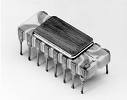 In a fairly long post yesterday, I wrote about antitrust policy and touched on the Intel (INTC) situation with the European Commission. They announced their findings with regard to Intel’s alleged anti-competitive behavior today, so here’s a quick follow-up.
In a fairly long post yesterday, I wrote about antitrust policy and touched on the Intel (INTC) situation with the European Commission. They announced their findings with regard to Intel’s alleged anti-competitive behavior today, so here’s a quick follow-up.
The commission fined Intel $1.45 billion and summed up its findings thusly:
In blunt words, the EU’s steely competition commissioner, Neelie Kroes, pronounced that her agency’s long investigation had “uncovered serious wrongdoing in the x86 processor market,” including proof that Intel had given partially or completely hidden rebates to computer makers on the condition that they buy all or nearly all of their x86 processors from Intel and not its smaller rival, Advanced Micro Devices (AMD).
The allegations against Intel which were brought by their competitor AMD was that Intel gave rebates to its customers on the condition they buy exclusively from Intel or buy a large percentage of their chips from Intel. Though the European Commission says that this activity resulted in harm to consumers, there seems to be some real questions as to whether that is in fact true.
Intel plans to appeal the commission’s findings. They contend that they ignored a substantial amount of evidence that mitigated against their findings.
As I noted yesterday, the Obama administration has signaled that its antitrust policy might align more closely with the European model. That model is one that seeks to regulate activities between firms as much as it seeks to ensure that the consumer is not harmed by monopolistic behavior. It is effectively a back door industrial policy masquerading as antitrust enforcement. It would be unfortunate if the administration takes U.S. policy in that direction.
More: here


Leave a Reply